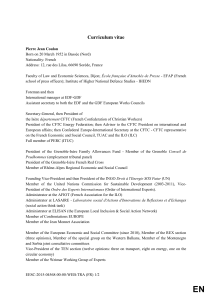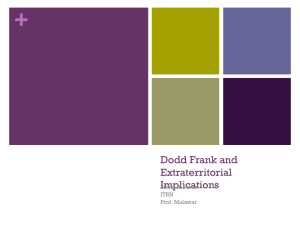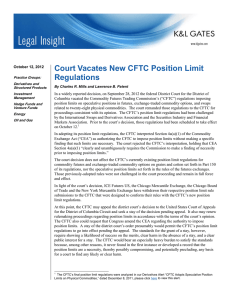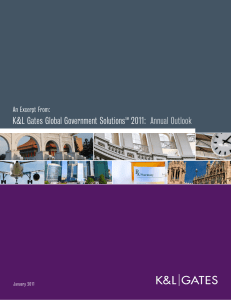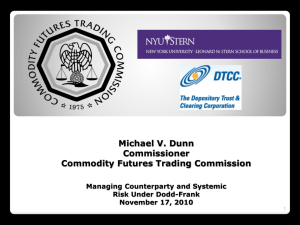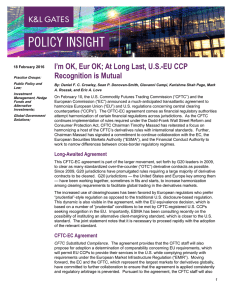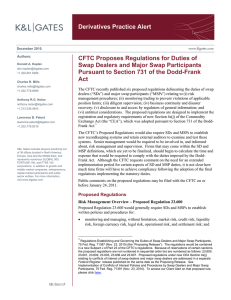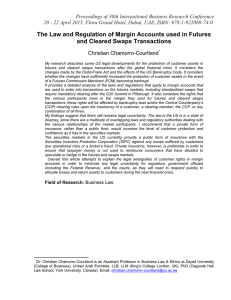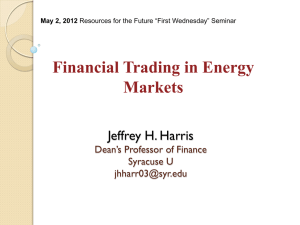Investment Management & Public Policy Alert
advertisement
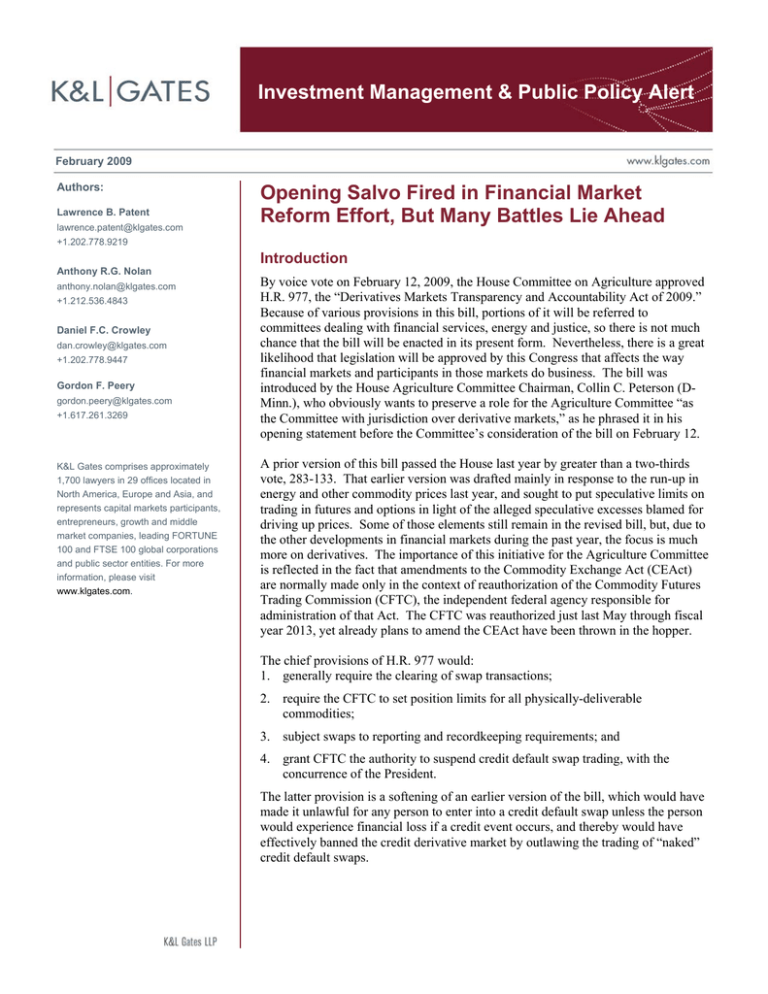
Investment Management & Public Policy Alert February 2009 Authors: Lawrence B. Patent lawrence.patent@klgates.com Opening Salvo Fired in Financial Market Reform Effort, But Many Battles Lie Ahead +1.202.778.9219 Introduction Anthony R.G. Nolan anthony.nolan@klgates.com +1.212.536.4843 Daniel F.C. Crowley dan.crowley@klgates.com +1.202.778.9447 Gordon F. Peery gordon.peery@klgates.com +1.617.261.3269 K&L Gates comprises approximately 1,700 lawyers in 29 offices located in North America, Europe and Asia, and represents capital markets participants, entrepreneurs, growth and middle market companies, leading FORTUNE 100 and FTSE 100 global corporations and public sector entities. For more information, please visit www.klgates.com. By voice vote on February 12, 2009, the House Committee on Agriculture approved H.R. 977, the “Derivatives Markets Transparency and Accountability Act of 2009.” Because of various provisions in this bill, portions of it will be referred to committees dealing with financial services, energy and justice, so there is not much chance that the bill will be enacted in its present form. Nevertheless, there is a great likelihood that legislation will be approved by this Congress that affects the way financial markets and participants in those markets do business. The bill was introduced by the House Agriculture Committee Chairman, Collin C. Peterson (DMinn.), who obviously wants to preserve a role for the Agriculture Committee “as the Committee with jurisdiction over derivative markets,” as he phrased it in his opening statement before the Committee’s consideration of the bill on February 12. A prior version of this bill passed the House last year by greater than a two-thirds vote, 283-133. That earlier version was drafted mainly in response to the run-up in energy and other commodity prices last year, and sought to put speculative limits on trading in futures and options in light of the alleged speculative excesses blamed for driving up prices. Some of those elements still remain in the revised bill, but, due to the other developments in financial markets during the past year, the focus is much more on derivatives. The importance of this initiative for the Agriculture Committee is reflected in the fact that amendments to the Commodity Exchange Act (CEAct) are normally made only in the context of reauthorization of the Commodity Futures Trading Commission (CFTC), the independent federal agency responsible for administration of that Act. The CFTC was reauthorized just last May through fiscal year 2013, yet already plans to amend the CEAct have been thrown in the hopper. The chief provisions of H.R. 977 would: 1. generally require the clearing of swap transactions; 2. require the CFTC to set position limits for all physically-deliverable commodities; 3. subject swaps to reporting and recordkeeping requirements; and 4. grant CFTC the authority to suspend credit default swap trading, with the concurrence of the President. The latter provision is a softening of an earlier version of the bill, which would have made it unlawful for any person to enter into a credit default swap unless the person would experience financial loss if a credit event occurs, and thereby would have effectively banned the credit derivative market by outlawing the trading of “naked” credit default swaps. Investment Management & Public Policy Alert Clearing Position Limits Clearing is the process by which trades are processed, guaranteed and settled by a clearing organization. Through a procedure known as “novation,” the clearinghouse takes both sides of each trade and becomes “the buyer to every seller and the seller to every buyer.” Having the clearing organization as the central counterparty substitutes the credit of the clearing organization for that of individual counterparties, and facilitates netting of obligations so that market participants can make a single payment to, or receive a single collection from, the clearing organization on a daily (and intraday) basis, rather than dealing with multiple funds transfers to all of their counterparties. Daily marking-to-market, requiring the posting of margin, and the ability to liquidate positions that are undermargined should help a clearing organization mitigate the impact of any single party’s default on other market participants. The bill approved by the House Agriculture Committee also retains the requirement from last year’s legislation that would require the CFTC to set speculative position limits for physically-deliverable commodities. Currently, the CFTC only has authority to set such limits for agricultural commodities, so this would expand CFTC’s authority to energy commodities and metals. The bill would also mandate that the hedging definition for these purposes require that the futures or option transaction represent a substitute for transactions made or to be made or positions taken or to be taken at a later time in a physical marketing channel, which would restrict the current broader view taken of what constitutes hedging and appropriate risk management. The CFTC also would have authority to impose speculative position limits for swaps that it finds to be fungible with contracts traded on exchanges and that have the potential to (1) disrupt an exchange’s liquidity or price discovery function, (2) cause a severe market disturbance in the underlying cash or futures market, or (3) prevent an exchange-listed contract from reflecting the forces of supply and demand. Although the House Agriculture Committee bill will generally require clearing of swaps through a CFTCregistered derivatives clearing organization (DCO) and would apply this to open transactions even if entered into prior to the bill’s effective date, certain exceptions are provided. If the swap agreement involves an “excluded” commodity under the CEAct, which is basically any financial instrument, a clearing agency regulated by the Securities and Exchange Commission (SEC) could do the clearing. The bill also provides an alternative to clearing that requires reporting the transaction to the CFTC. This alternative is presumably intended to cover specialized swap instruments that a DCO or clearing agency would not find profitable to clear due to its particular characteristics and lack of fungibility with other swaps. To qualify for this reporting alternative, the parties to the agreement and the agreement itself would have to meet financial integrity standards established by the CFTC, including a net capital requirement for the parties comparable to that imposed by a DCO on its clearing members. The CFTC could, therefore, make it very difficult -- if not impossible -- to engage in highly individualized swap agreements, depending upon how strict it makes the financial integrity standards. The requirements for clearing or reporting of transactions would not apply to spot or forward transactions, as defined by the CFTC. Procedural Provisions There are several procedural provisions in the bill that make it problematical from the standpoint of the potential new authorities to be given to CFTC, as well as with respect to prior CFTC actions. As noted above, existing swap agreements, entered into in good faith under existing federal law, could be impacted by the new clearing requirement. Older agreements may be more likely to have individualized terms that would not be that attractive to a DCO. If a DCO declines to clear such an agreement, and the agreement cannot meet the CFTC’s financial integrity criteria to qualify for the reporting exception, the validity of the agreement could be in doubt. CFTC would also be granted the power to “use emergency and expedited procedures (including any administrative or other procedure as appropriate) to carry out this Act if, in its discretion, it deems it necessary to do so.” This procedural power would apply to the authority to suspend trading of credit default swaps, unless the President disapproves, if “in the opinion of the [CFTC] the public interest February 2009 2 Investment Management & Public Policy Alert and the protection of investors so require.” It is unclear to what extent the CFTC would be bound by the Administrative Procedure Act or any other standards besides the President’s disapproval in making such determination. Some of the procedural requirements in the bill appear to be particular favorites of current CFTC Commissioners. One provision of the bill appears designed to satisfy Acting Chairman Michael V. Dunn by directing the CFTC to review all prior actions (including exemptions, guidance and noaction letters) taken by the CFTC, its staff, the exchanges, DCOs and the National Futures Association, to ensure that such prior actions are in compliance with the CEAct. There is no deadline set for this review, but it could create legal uncertainty about the validity of actions taken in good faith reliance on existing law. Separate and apart from swaps, certain exchange-traded funds that are based upon tracking the movements of agricultural futures have received exemptions from position limits. These exemptions would be subject to review and thus the bill would create uncertainty about the ability of the exchange-traded funds to carry out their role. Another example is a new final section to H.R. 977, which would grant the CFTC the authority to conduct criminal litigation relating to violations of the CEAct if the Attorney General has declined to do so. This appears to reflect a speech that Commissioner Bartholomew H. Chilton delivered in Washington on February 10, 2009. In this speech, he argued that the CFTC should have authority to prosecute alleged criminal violations of the CEAct and suggested that CFTC attorneys would be better able to bring such cases due to the highly specialized and complex nature of the futures markets, which the generalists at the Department of Justice could not be expected to master. Voilà! Two days later, the House Agriculture Committee added a provision to the bill that is directly responsive to this concern. Other Agencies’ Interest The criminal authority provision is just one of those in the bill that will cause not only several other Congressional committees to weigh in on this legislation, but several federal agencies as well. The Attorney General will certainly have an opinion on the last section of the bill. The Secretary of Agriculture may have something to say on the section of the bill dealing with emission allowances and offset credits, because CFTC is directed to enter into a memorandum of understanding (MOU) with the Secretary of Agriculture to ensure that the development of procedures and protocols for a market-based greenhouse gas (GHG) program, i.e., the trading part of any cap-and-trade system intended to reduce GHG emissions, are properly constructed and coordinated to maximize credits for carbon sequestration. Undoubtedly, the Environmental Protection Agency, as well as the Department of Energy and Federal Energy Regulatory Commission, may also be interested in this provision. (The bill would also remove GHG emissions and credits from the definition of “exempt commodity,” thus requiring futures and options thereon to be traded on designated contract markets only, and would not permit such trading on exempt commercial markets.) Of course, the other members of the President’s Working Group on Financial Markets in addition to the Acting Chairman of the CFTC, the Treasury Secretary, the Chairman of the SEC and the Chairman of the Board of Governors of the Federal Reserve System, will want to be heard on this legislation as well. The Fed Chairman may have something to say about the provision that bars the Fed from any authority to establish regulations about clearing swaps, particularly in light of the fact that the CFTC, the Fed and the SEC entered into an MOU on November 13, 2008, to establish a framework for consultation and information sharing on issues related to credit default swap central counterparties, facilitating the regulatory approval process, and promoting more consistent regulatory oversight. Conclusion The fact that H.R. 977 would have an impact on the jurisdiction of so many arms of the federal government illustrates why it is unlikely to become law in its present form. Nevertheless, there is a definite mood in Washington to “do something” to address the problems in the financial markets, whether it be with new laws, new regulations, new agencies, or all of the above. Thus, the provisions of H.R. 977 are out there as a marker with the unanimous approval of the House Agriculture Committee. Even if the bill itself does not make it February 2009 3 Investment Management & Public Policy Alert into law, some of its provisions may survive the legislative process in some form, and its author, Chairman Peterson, has established himself as a player to whom attention should be paid in the development of new rules of the road for the financial markets and participants. Taken together with the flurry of recent legislative initiatives to regulate the over-the-counter derivatives market, including a bill introduced by Chairman Tom Harkin (D-Iowa) of the Senate Committee on Agriculture, Nutrition and Forestry in January 2009 to require all swaps to be traded on regulated exchanges, as well as calls by the New York State insurance commissioner and the former chairman of the SEC for federal regulation of the credit default swaps market, this illustrates the pressure for increased regulation of the swaps market. Regardless of what happens to H.R. 977, the times they are a changing! K&L Gates comprises multiple affiliated partnerships: a limited liability partnership with the full name K&L Gates LLP qualified in Delaware and maintaining offices throughout the U.S., in Berlin and Frankfurt, Germany, in Beijing (K&L Gates LLP Beijing Representative Office), and in Shanghai (K&L Gates LLP Shanghai Representative Office); a limited liability partnership (also named K&L Gates LLP) incorporated in England and maintaining our London and Paris offices; a Taiwan general partnership (K&L Gates) which practices from our Taipei office; and a Hong Kong general partnership (K&L Gates, Solicitors) which practices from our Hong Kong office. K&L Gates maintains appropriate registrations in the jurisdictions in which its offices are located. A list of the partners in each entity is available for inspection at any K&L Gates office. This publication is for informational purposes and does not contain or convey legal advice. The information herein should not be used or relied upon in regard to any particular facts or circumstances without first consulting a lawyer. ©2009 K&L Gates LLP. All Rights Reserved. February 2009 4
